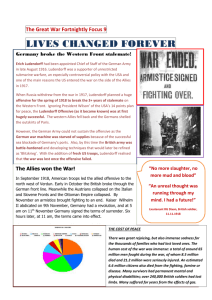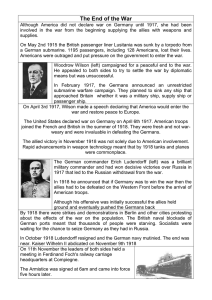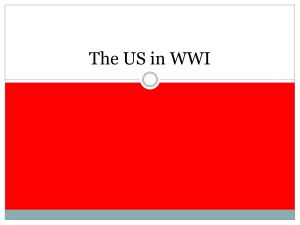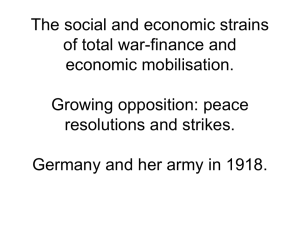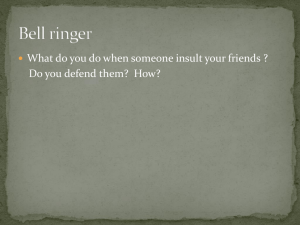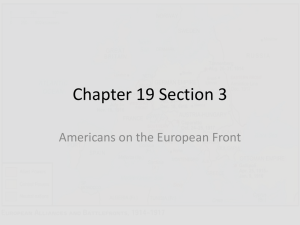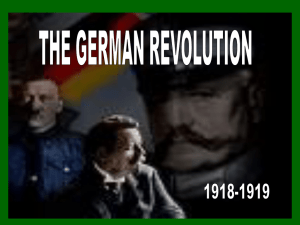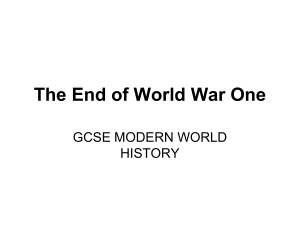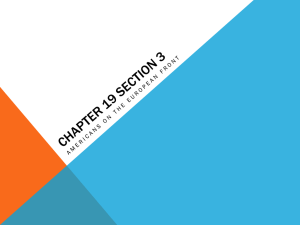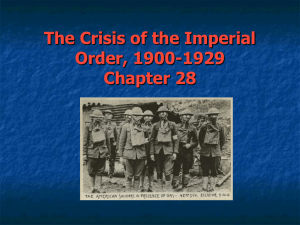Why were the Central Powers Defeated in the
advertisement
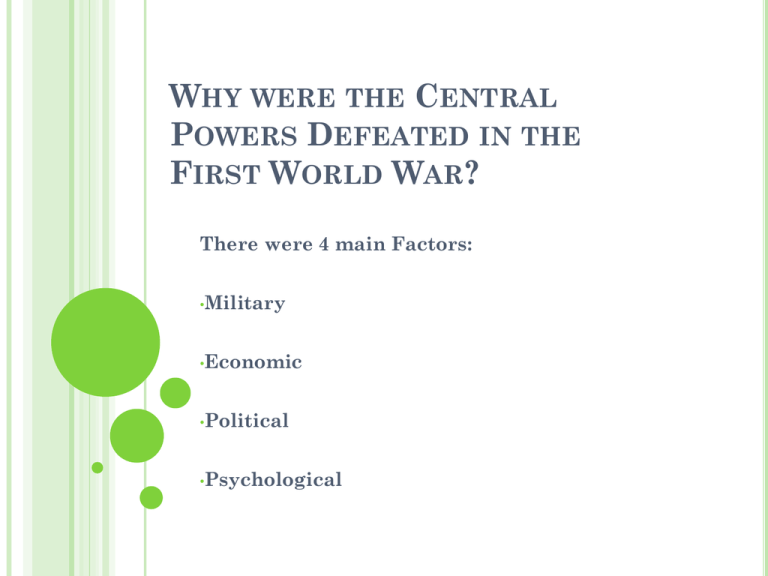
WHY WERE THE CENTRAL POWERS DEFEATED IN THE FIRST WORLD WAR? There were 4 main Factors: •Military •Economic •Political •Psychological MILITARY FACTORS: Germany faced defeat on the Western Front largely because of Allied weight of numbers and German lack of resources, as the war dragged on Ludendorff could have used the troops from the Russian front to bolster those on the Western front and wait for the war-weary Allies to make peace, but decided to gamble on an offensive Ludendorff Offensive in March-July was nearly successful, and brilliantly organised but a strategic defeat, particularly as the army outran its supplies MILITARY CONT: US joined the war on April 17 1917, and nearly 2 million US troops landed by August 1918 Military problems were exacerbated by the outbreak of Spanish flu, which affected half a million German soldiers Bulgaria collapses on Sept 20 at Battle of Dorian, gets no support from Germany Turkish army defeated in Palestine by the British. Signed peace terms on Oct 1. British polygot army (including West Indians and Nigerians) was more effective than expected MILITARY FACTORS CONT: Battle of Vittorio Veneto about Oct 24, won by Italy, caused Austrians to desert to Italy Austrians seek ceasefire on Nov 3. Germany now alone Germany’s loss of allies is humiliating although militarily it makes no difference ECONOMIC FACTORS Strain on Germany to support its industrially weak allies Civilian hardship in Germany as food supplies dwindled, eg. Meat consumption fell to 12 % of pre-war level Germany isolated economically by the British naval blockade, affecting areas such as food supplies, fuel, raw materials and troop movements US economic reserves in all areas bolstered fading allies POLITICAL FACTORS Austrian Empire falls apart. Yugoslavs, Poles, Czechoslovaks, Hungarians all declare independence between Oct 6 and Nov 1 Germany isolated by the collapse of its allies. German navy mutinies at Kiel Oct 27, spread to civilians who demand political reforms Political unrest in Germany, culminating in the Oct-Nov revolution Kaiser abdicates Nov 1917. This is a symbol of the old system admitting failure POLITICAL CONT: Pacifists, socialists, strikers and “gentlemen” form a quasi democratic ministry. Allow military to blame them and give the military a “way out” for the war loss. This is planned by the military generals. PSYCHOLOGICAL FACTORS Armies were exhausted, eg. The Imperial army had 1400 (mainly Hungarian) deserters on 1 day in early Oct because of hunger The connection between the military and civilian populations meant that the “total” war effect influenced the mindset of Germans Many Germans had felt this was a defensive war and did not have the mindset for a war of conquest The concept of the “Burgfrieden” was breaking down as German society became divided eg. The Reichstag voted 212 to 126 for a peace resolution. PSYCHOLOGICAL CONT: Winter 1917 was the “turnip winter” Deaths from starvation and hypothermia were 121 000 in 1916 and 293 000 in 1918 in Germany Military leaders such as Ludendorff and Hindenburg blocked compromise peace opportunities Assertive German nationalists wanted “Siegfriede”- a peace through victory which demanded lands to the east, west and overseas Germany felt alone and war-weary, which was a great contrast to the mood going into the war The armistice was signed on 11 Nov 1918
